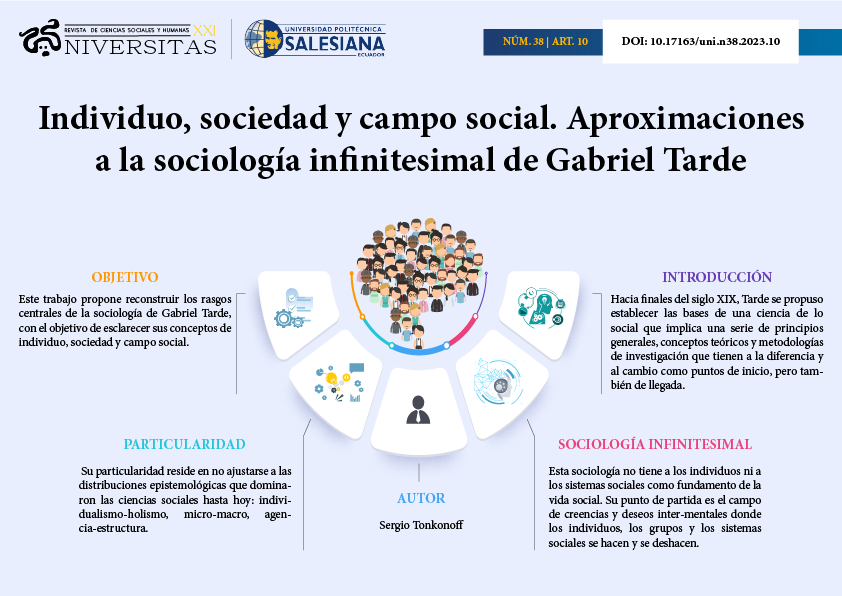Individual, society and social field. Approaching Gabriel Tarde’s infinitesimal sociology
Main Article Content
Abstract
Article Details
Universitas-XXI Journal aligns with the principles of open access and academic collaboration by adopting the Creative Commons Attribution-NonCommercial-ShareAlike 4.0 International License (CC BY-NC-SA 4.0). This license ensures that published content can be used and shared widely under the following conditions:
Attribution: Authors and the journal must be appropriately credited as the original creators of the content, with full reference and a link to the publication provided.
Non-commercial use: Content may not be used for commercial purposes, preserving its academic and educational intent.
ShareAlike: Derivative works must be distributed under the same terms as this license, promoting the creation of accessible and equitable knowledge.
By implementing this license, the Universitas-XXI Journal strengthens its commitment to disseminating high-quality research, providing free access to knowledge, and fostering a collaborative environment among researchers, educators, and students worldwide.
This decision reflects core values of responsibility, ethics, and transparency in academia, ensuring that intellectual contributions serve as a foundation for new research and projects while respecting the rights of authors and the scientific community.
For more information about this license, please visit the following link: https://creativecommons.org/licenses/by-nc-sa/4.0/"
References
Blondel, Ch. (1928). Introduction à la psychologie collective. A. Colin.
Candea M. (ed.) (2010). The social after Gabriel Tarde: Debates and Assessments. Routledge.
Castoriadis, C. (2010). La institución imaginaria de la sociedad. Tusquets.
Deleuze, G. (2009). Diferencia y repetición. Amorrortu.
Deleuze, G. y Guattari, F. (2002) Mil mesetas. Capitalismo y esquizofrenia. Pre-Textos.
Durkheim, E. (1975) “Crime et santé sociale” En Textes: religion, morale, anomie. Minuit (pp. 173-180).
Foucault, M. (1989).Vigilar y castigar. Nacimiento de la prisión.Siglo XXI.
Latour, B. (2002) Gabriel Tarde and the end of the social. En P.Joyce (ed.), The social in question: new bearings in History and de Social Sciencies (pp. 117-132). Routledge.
Latour, B (2005). Reassembling the social: an introduction to actor-network-theory. Oxford University Press.
Latour, B. (2010). “Tarde's idea of quantification”. En M. Candea (ed.), The Social after Gabriel Tarde. Debates and assessments (pp. 145-163). Routledge.
Lazzarato, M. (2002). Puissances de l’invention. La Psychologie économique de Gabriel Tarde contre l’économie politique. Les Empêcheurs de Penser en Rond, Le Seuil.
Lukes, S. (1968). Methodological individualism reconsidered. The British Journal of Sociology, 19 (2), 119-129.https://doi.org/10.2307/588689
Sampson, T. (2012). Virality. Contagion theory in the age of networks. University of Minnesota Press.
Tarde, G. (1882). Les traits communs de la nature et de l’histoire. Revue philosophique, XIV, 270-291.
Tarde, G. (1890) Les lois de l’imitation: étude sociologique. Alcan.
Tarde, G. (1898). Les lois sociales: esquisse d’une sociologie. Alcan.
Tarde, G. (1898a). Études de psychologie sociale. Giard et Brière.
Tarde, G. (1895). La logique sociale. Alcan.
Tarde, G. (1895a). Essais et mélanges sociologiques. Storck.
Tonkonoff, S. (2017). From Tarde to Deleuze and Foucault. The infinitesimal Revolution. Palgrave Macmillan.

